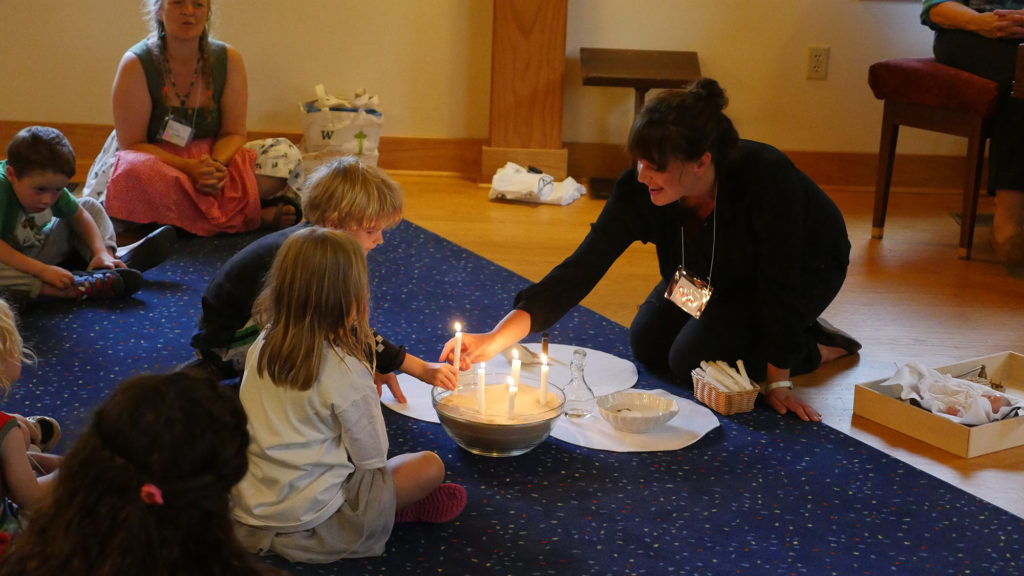
Remember the day of your baptism.
“I like the fire.” The smallest children answer first, eyes still locked on the smoldering candles half submerged in the great glass bowl of sand. “I like smelling the oil.”
“The light’s not gone,” says someone older, “it’s only changed.”
This wondering isn’t unfolding in a Godly Play room. We’re in the parish hall, where big bowls of potato salad and coleslaw are lined up like train cars behind Southern BBQ and platters of pickles and homegrown tomatoes. We are sitting on the same rug some of the children know, but strong hands have hauled it through the corridor and placed it here in the center of everything. The little ones crowd close to the storyteller while older children and adults sit in a half moon near the corners of the rug and on the floor and in chairs like layers of nested parentheses.
When the joint Vacation Bible School at a nearby church was canceled, Rector Rob Lamborn wondered if Otey Memorial Parish in Sewanee, TN should try an evening program at our own parish. As the new Christian Formation Director, I wanted to do something truly intergenerational.
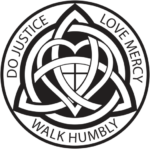 Instead of calling it VBS, we began to call it VB-Us. For four consecutive nights, we offered a dinner and learning series on the theme of Micah 6:8, “Do justly, love mercy, walk humbly.” Each evening began with a meal, a hymn and a Godly Play story. Then participants were invited to choose their work. We designed workshops and art activities to appeal to different abilities and learning styles. Nothing was segregated by age.
Instead of calling it VBS, we began to call it VB-Us. For four consecutive nights, we offered a dinner and learning series on the theme of Micah 6:8, “Do justly, love mercy, walk humbly.” Each evening began with a meal, a hymn and a Godly Play story. Then participants were invited to choose their work. We designed workshops and art activities to appeal to different abilities and learning styles. Nothing was segregated by age.
Do Justice
Monday night, Regan Schutz of the Godly Play Foundation grounded the week in the story of our baptism. Activity choices included a drum circle or a panel discussion on local justice issues. For the panel, we invited a church historian, a civil rights activist who helped desegregate the school across the street, and county teacher Jennie Turrell and her student Allie Faxon who are currently engaged in the struggle for LGBTQ student rights. Participants considered the similarities between those issues which now seem clear to us, and those we are still learning.
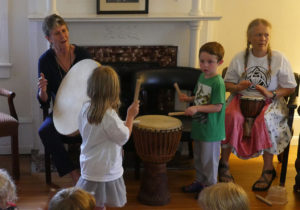
Learning about justice in a drum circle
The drum circle was also popular, attracting people in their sixties and seventies, babies, and all ages between. With drums, shakers, and kitchen utensils, we learned to keep rhythm together. Drumming offered a backdrop for stories of justice and thinking together about the dynamics of group interaction. “In four beats,” the leader would say, “We’re all going to break together.” Even the smallest toddler knew when to stop tapping her upturned plastic bowl.
Love Mercy
On Tuesday, Godly Play Registrar Teresa Phares gathered the children and adults on the floor with a golden parable box and told how a lawyer asked, “Who is my neighbor?” For our work, some chose to learn more about our own neighbors. Betty Carpenter, director of Community Action Committee which is housed in our parish, shared about the one thousand times someone stepped across the threshold to seek help last year.
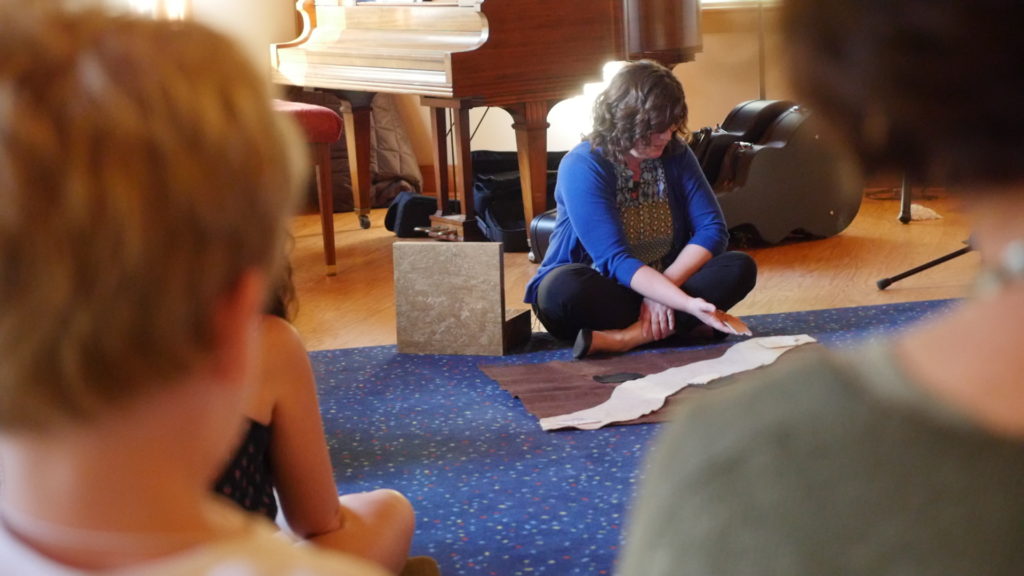
I wonder what this could be?
Others worked on poetry with Professor Jennifer Michael. Beginning with Micah and coming up through modern times, they explored how prophets use poetry to struggle for justice and mercy rather than crossing the road and looking away. Participants then spread out through the old parish house to begin writing their own prophetic poetry.
Walk Humbly
Wednesday night was contemplative in tone. We considered the act of creation. God’s original blessing, and walking with God in the cool of the day. Rebecca Van de Ven offered two Godly Play stories side by side: Second Creation, “The Falling Apart,” and The Parable of the Good Samaritan.
Suggestions for work that night included a couple of art projects, for which Rebecca was playing contemplative music on her oboe. As she began to play, a small child spontaneously ran to the Godly Play rug and transformed it into a floor for interpretive dance.
As the child danced, a few women processed their experiences through collage art, while a large group of children collaborated with some adults to make sea glass mosaics. Another group joined the Rev. Bude Van Dyke for a pilgrimage to the sacred fire. In this outdoor circle, participants contemplated the injustice of the Trail of Tears which runs right by our church property. They considered how to do justice, love mercy, and walk humbly — both personally and as a church, to Native Americans and to the land.
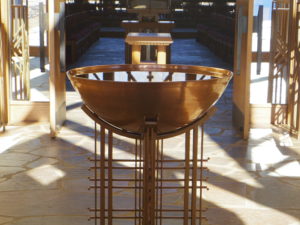
I will, with God’s help.
Remember the Day of Your Baptism
Jim Goodmann of the Beecken Center and Education for Ministry director Karen Meridith guided us through our final evening. We gathered on the rug to wonder about the story of Ruth. Who was a neighbor to Ruth? To Naomi? Someone wondered why the differences discovered in the garden did not seem very important to Ruth, Naomi, or Boaz. We reconsidered our VB-Us logo with its interwoven symbols. Justice, mercy, and walking humbly with God cannot be teased apart. As we stood at the outdoor altar for the closing Eucharist, Karen challenged us to consider carefully each line of our Baptismal Covenant, and offer the liturgical response, “I will, with God’s help.”
Reflecting on the experience, and considering how it to improve it next year, I find myself returning to classic Godly Play questions. What I liked best were the unexpected moments like the child dancing on the Godly Play rug. I wanted the rug in the parish hall as a practical measure, grounding the storyteller and making the listeners physically comfortable, but it also served as a symbol.
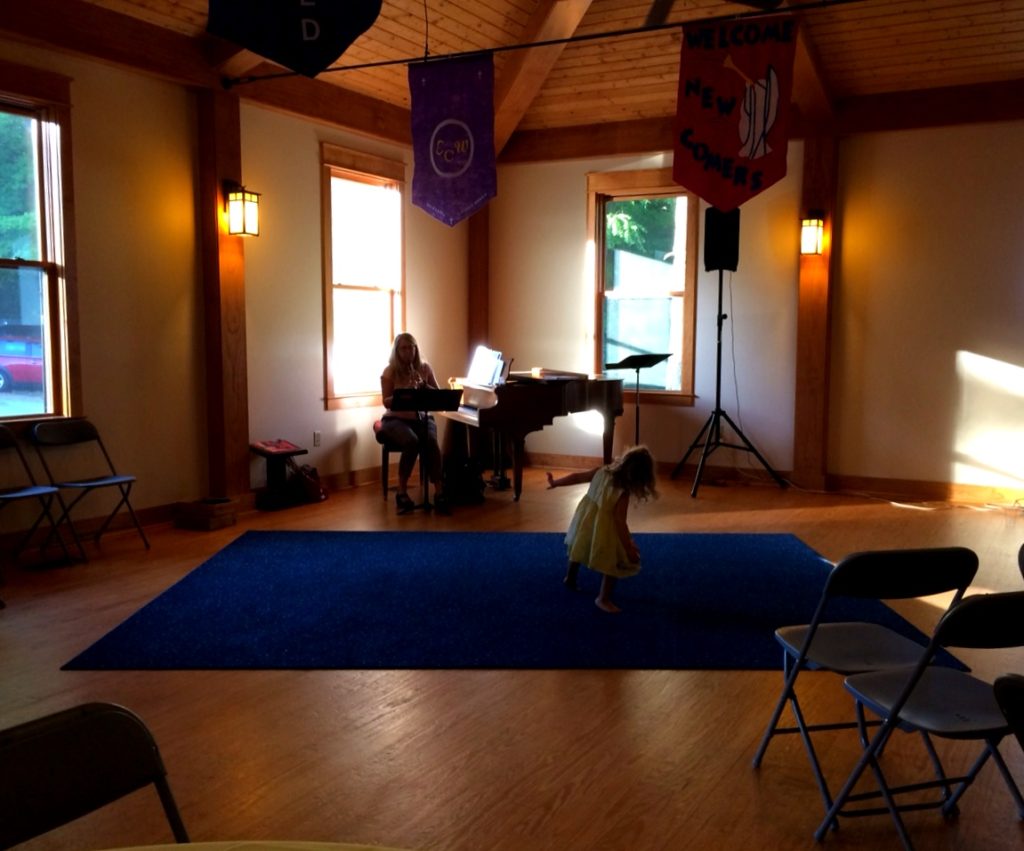
Walking humbly sometimes means dancing
What became most important to me during the week, was a question we ask in most every Godly Play circle, something like, “I wonder what you’d like to work with today?” As we designed the VB-Us program, we wanted to make the call of Micah 6:8 really local, personal, and immediate. We did not look at global justice (although that is important), but what is happening in our small town and our county, recently and right now. We brought it back to what we can touch. The Micah question is personal; “What does the Lord require of you?” Godly Play asks a more immediate question: “What is your work today?”
At a time in our nation and our world when many are hurting, many are struggling against their own oppression, and many are waking up to the oppression of others, it may also help to remember that not all of our work looks like toil. Just as children’s work often takes the form of art response, collaboration, retelling the story or connecting it to another story they know, our work is also to respond in the way God inspires us, day by day. What is your work today?
— Jeannie Babb, Communications Developer for the Godly Play Foundation
(Photos by Jeannie Babb and Philip Luckey)
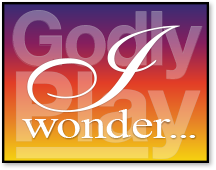
So inspiring and on target for a way to be church in community. Thank you for sharing.
Thank you for the detailed descriptions. It’s encouraging.